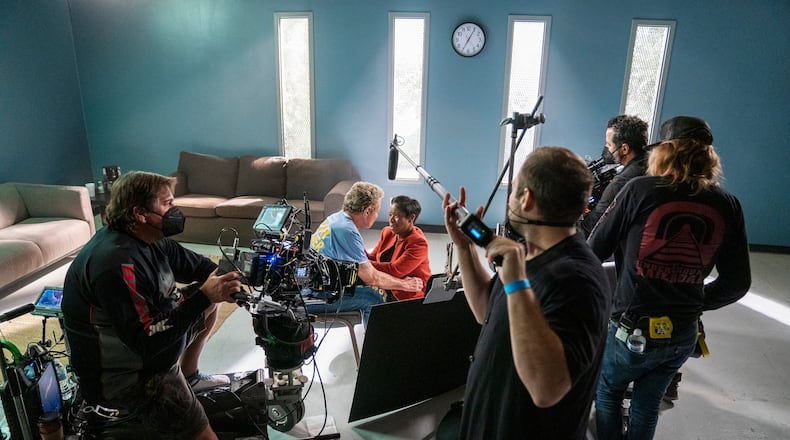Conyers resident Lamont Ferrell, who has spent 25 years writing for TV shows ranging from “The Parent ‘Hood” to “Mann and Wife,” recalled working picket lines in Los Angeles 16 years ago, the last time TV writers went on strike.
“It was crazy,” he said. “It was like a TV series in and of itself. We were out there almost every day. It lasted 100 days!”
Credit: CONTRIBUTED
Credit: CONTRIBUTED
Another strike is looming, a situation that has already caused media companies to slow greenlighting new TV projects. May 1 is the deadline for the Writers Guild of America to resolve issues with the Alliance of Motion Picture and Television Producers (AMPTP), which represents Hollywood production companies.
The 2007 writers strike had minimal impact on Georgia because the state at the time had a relatively weak tax credit and few productions shooting. But this time around, the impact will be much larger.
Thanks to a generous 2008 tax credit for TV and film production companies, companies like Disney, Lionsgate, Amazon and Netflix are spending more than $4 billion a year in the state every year. Georgia is now the third most active production hub in the United States behind only New York and California.
The union is seeking to raise writers’ minimum wages as well as compensation and residuals for writers whose projects land on streaming services.
While thousands of set constructors, gaffers and hair stylists work on TV and film in Georgia now, a vast majority of WGA writers are clustered in Los Angeles and New York City. Only 36 of the WGA’s 9,000 dues-paying members live in Georgia and 161 in the entire Southeast.
If there is a strike, expect plenty of picket lines in Los Angeles but not in Atlanta. “Gathering all the Georgia writers would be like holding a large dinner party,” joked Topher Payne, a Decatur resident and WGA member who has written numerous Hallmark romcom and holiday films.
Despite the anticipated lack of picket lines, Georgia will still feel the impact of the strike. Even if the writers aren’t physically in the state, their work is crucial in getting productions off the ground.
The crux of the matter is the massive shift in viewing habits by the public from traditional broadcast and cable channels to streaming platforms. The pandemic gave streamers a major boost as well.
For a time, this seemed like a boon to writers. But there was a problem. Writers often relied on generous residual payments from repeats of TV shows and films on broadcast and cable to fill the gaps between gigs. But when those programs and movies land on a streaming service, writers don’t get compensated nearly as well.
“Most streaming services try to bypass the WGA residual set up by paying a larger amount upfront,” said Payne, who has relied on residuals for steady income. “This sounds great. You get a first check and say, ‘Holy cow! That’s the most I’ve ever been paid at one time. But you feel the burn later when the series has millions of viewers all over the world and you receive no bonus for that.”
And when Hallmark movies get licensed to streaming services, Payne isn’t even informed. He found some of his films on the Peacock streaming service by happenstance. And the check he received after his movies landed on Amazon Prime was not impressive.
Credit: CONTRIBUTED
Credit: CONTRIBUTED
Writers over the past 10 years have seen their pay on average drop off. The new contract, Payne said, will hopefully rectify that problem. But he isn’t sure the two sides are anywhere close to agreement yet.
“I believe a strike is inevitable,” he said.
It doesn’t help that the Wild West spending of recent years appears to have peaked over the past year. Streaming services have been slashing their budgets. Netflix and HBO Max had layoffs last summer. This past week, Disney announced cutbacks at both Disney+ and Hulu, while Amazon cut jobs at its production company and streaming service.
A slowing economy and weaker ad sales are hurting TV across the board, including broadcast and cable. TV shows like CBS’s “Blue Bloods” and “Bob Hearts Abishola” are trimming salaries and cast members.
For these multiple reasons, film and TV production in Georgia is significantly slower at this point this year than a year ago when about 50 to 55 active productions were happening. Currently, that number is in the mid-30s.
In recent months, producers have been stockpiling scripts in case a strike occurs. Anything shooting now or soon in Georgia should have all scripts in hand.
“Both networks and streamers have completely slowed down accepting new projects,” said Craig Miller, who runs a film production service in Atlanta. “If you’re pitching anything right now, they will only say yes if they believe it will be a guaranteed success.”
Tom Luse, a former production manager and producer for AMC’s “The Walking Dead” and currently producing a film with Georgia State University students, said production companies are being cautious because they don’t want to start a TV series without all the scripts in hand.
Movies won’t be impacted as badly because there is just one script, not multiple scripts for multiple episodes. But if a film has to move its location from Miami to Atlanta and forces script changes, that could cause problems during a strike when union writers are not allowed to actually write anything, much less rewrite a script, Luse said.
“Shows already in production by and large will get through this,” he said.
It’s therefore expected that the 14 TV series currently shooting in Georgia should, by and large, finish out their season orders. That includes the second season of Apple TV+’s “The Big Door Prize,” the third season of Starz’ drama “BMF,” Disney+’s “Agatha: Coven of Chaos” starring Kathryn Hahn and a new Peacock series “Hysteria” featuring Julie Bowen, Anna Camp and Bruce Campbell.
Credit: APPLE TV+
Credit: APPLE TV+
Most notably, Netflix’s popular “Cobra Kai” is scheduled to shoot its sixth and final season starting May 2 and set to run through November.
Big-budget films now in production such as Marvel’s latest “Captain America” movie with Anthony Mackie, “Bad Boys 4″ starring Will Smith and Martin Lawrence and Netflix’s “The Piano Lesson” with Samuel L. Jackson should be able to endure the strike.
Luse noted that “anything new is going to be affected. A place like Atlanta is going to feel it if there’s a strike given the infrastructure here. And most of that infrastructure is people. They are going to lose work.”
A returning broadcast TV crime procedural like ABC’s “Will Trent,” which is set and shot in Atlanta, might see delays if a strike lasts more than a few weeks.
Shows shooting in Georgia not impacted by a potential writers strike include reality programs like WE-TV’s “Mama June” and TLC’s “7 Little Johnstons” or true crime like A&E’s “The First 48.”
Writers are ready to strike. Earlier this month, nearly 98% of voting WGA members, more than 9,000 writers, authorized a potential walkout. That is the highest approval rate ever for a strike authorization vote in WGA’s history.
What deal the writers can carve out will also impact the unions representing the actors (SAG-AFTRA) and directors (Directors Guild of America), who also have expiring contracts up for renewal later in the summer.
Atlanta actress and SAG-AFTRA member Samantha Worthen said she has seen audition opportunities dry up in recent months.
“But as a union member, I fully support the writers,” she said. “I was around for the last strike and I remember how it ended up helping reality television.”
If the strike happens, its full impact on Georgia’s film and TV production may not be clear for a while, and negotiations remain fluid. Both sides could extend the May 1 deadline if they choose.
About the Author
Keep Reading
The Latest
Featured







